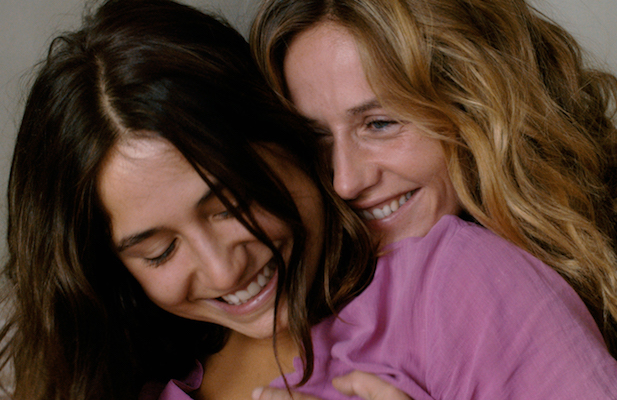
BY STEVE ERICKSON | Even the best films about lesbians directed by men, such as Robert Aldrich’s “The Killing of Sister George” and David Lynch’s “Mulholland Drive,” tend to end unhappily, if not tragically. A new French film directed by a lesbian, Catherine Corsini’s “Summertime,” both follows this pattern and subverts it. It might be the closest anyone has come to “the lesbian ‘Brokeback Mountain’” yet.
There’s no real equivalent in French cinema to the Western, but “Summertime” evokes the appeal of the French countryside as well as any Anthony Mann or Budd Boetticher film did for our own rural areas. It traces out a conflict between country mouse and city mouse where lesbianism — including the tensions of coming out in the early 1970s, even for a hip Parisian involved in political activism — has a major role to play, but not the only one.
Young Delphine (Izïa Higelin) likes rural life, but a local woman has broken her heart by leaving her and getting married to a man. She decides to move to Paris. Quickly, she meets activist Carole (Cécile de France), who lives with her boyfriend. The two attend feminist meetings and become attracted to each other, although Carole has no sexual experience with women. Things seem to be working out well, as the copious nudity and sex scenes testify, but then Delphine’s father has a stroke and can’t run his farm anymore. She feels the need to return home, although Carole can still visit her on weekends.
Corsini’s direction of the early scenes of feminist activism seems influenced by silent comedy. The feminists go out pinching men’s butts in revenge for men’s objectification of their bodies. They throw veal at a doctor who speaks against abortion. Their meetings are loud and raucous. (In an indication of the limits of second wave feminism and/ or the demographics of early ‘70s France, they sing about women being enslaved while in a crowded room but without any people of color.) When they finally decide to free a gay man from a mental hospital, Janis Joplin’s “Me and Bobby McGee” plays on the soundtrack. The emphasis seems to be more on freedom than the “nothing left to lose” part of the lyrics.
Delphine, however, doesn’t have any real political commitment. Her attraction to feminism is a longing for Carole. She only really understands how it applies to her life when she has to run a farm in an ultra-patriarchal environment.
Corsini evokes the French countryside with a seductive atmosphere. Delphine is so devoted to rural France that she can tell the difference between different regional soils. As she relates, the region where she came from has muddy, perpetually damp ground that one sinks into, even in summer. Delphine and Carole’s idyll in the country is depicted with lush, sunny cinematography, and the colors flatter both actresses. Delphine does hard work each day — it’s not entirely clear how Carole occupies her time — but she seems to enjoy it.
The concept that “the personal is the political” was popularized by feminism and has become a bit of a cliché by now. With Corsini’s film, even her casting is a political statement. It would have been easy for her to cast two women who look like supermodels, and if “Summertime” were even a medium-budget American film, that no doubt would’ve been the case. Like Lena Dunham, Izïa Higelin is slightly chunky and doesn’t quite fit America’s narrow standards of female beauty. She’s believable as a woman who grew up on a farm, not dieting and reading fashion magazines. Carole is more conventionally beautiful; given that Cécile de France’s first prominent role was in the homophobic horror film “High Tension,” perhaps she’s doing penance here.
The middle third of “Summertime” evokes a paradise — family problems, hard work, and all — that can’t last. Carrying on a closeted romance in the midst of this Eden is dangerous. Even more perilously, Delphine may be more devoted to country life than Carole. Many LGBT people have no nostalgia for the small towns where we grew up and are happy to have escaped from them. That’s not the case for Delphine. A lesbian who wants to own a family farm is someone new in LGBT cinema, which has generally been geared toward the kind of politicized urban subcultures depicted in the beginning of “Summertime.” Corsini pulls off an epic romance and an austere melodrama with great skill.
SUMMERTIME | Directed by Catherine Corsini | Strand Releasing | In French with English subtitles | Opens Jul. 22 | IFC Center, 323 Sixth Ave. at W. Third St.; ifccenter.com | Film Society of Lincoln Center, 165 W. 65th St.; filmlinc.org


































